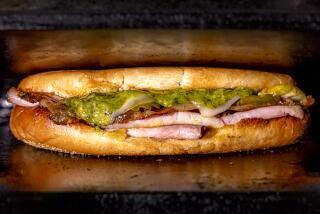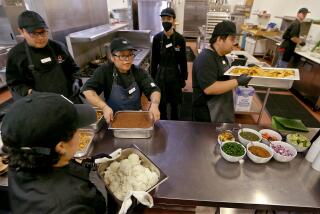Military Chefs Ready to Take Orders
- Share via
LAS VEGAS — Staff Sgt. Gregory Freeman has a new nickname on the job as a cook at Nellis Air Force Base.
“They call me Mr. Rio,” he says, grinning. Freeman is one of the base’s first two cooks to complete sous-chef training at the Rio.
The exchange program, which began in October, involves an eight-week placement at the Rio for outstanding Nellis kitchen personnel, who compete against each other for the honor.
Food supervisors at Nellis approached the Rio to propose the arrangement, said Bryan O’Shields, Rio’s director of food and beverage.
The idea was a natural, said the two who came up with it, Master Sgt. Tim Perez and Master Sgt. Norma Crichlow, both with the 99th Services Squadron at Nellis. The 99th runs three cafeterias on the base.
“The glamour of Las Vegas and the [hotel] industry are so close,” Perez explained. “Anyone can step out of the [Nellis] gate, and pay $1.99 for breakfast. That gives us pressure to compete. . . . We consider the Rio to be the best in Las Vegas.”
But Nellis Air Force Base is no slouch, either, when it comes to a reputation, in its own circles, for good food. The base has twice won a trophy for top food service in Air Combat Command, its Air Force division.
At the Rio, Freeman, 36, considered himself a sort of ambassador for the military. He rotated through each section of the Rio’s kitchen and “every time I went to a new area, you had to sell them” on the notion that the military can produce good food.
“They thought we cooked powdered eggs, and those [meals] out of a can,” Freeman said, laughing. “They’re a little bit more extravagant. They use a lot of fresh herbs, because they don’t have a [tight] budget. . . . But when they see you work, they accept you as an equal.”
*
From the stint at the Rio, Freeman said he improved skills in several areas. He brought back new ways to prepare chicken as well as new sauces. In addition, he got to work with time-saving equipment used in the private sector that the military goes without--such as a meat-marinading machine that can do in less than an hour a task that takes overnight using Nellis’ traditional equipment.
It was also fun for Freeman--who’s been in Air Force food service 14 years--to taste some culinary freedom not possible on base. “They can cook meat to a person’s liking,” he said. “In the military, it must be cooked well-done”--per regulations passed after a string of civilian deaths from eating undercooked hamburgers, which were tainted with E. coli bacteria.
And yet, Freeman continued, in some ways military cooks do better than their private-sector peers. At the Rio, “if [chefs] dirtied up something, somebody else will come after to clean up. In the military, you wipe as you go.”
Also, military cooks sometimes need to perform under adverse conditions. Shortly before his Rio assignment, Freeman was among those from the 99th Services Squadron who spent time in Saudi Arabia during construction of a new air base for coalition forces. He cooked in a tent, using water from temporary tanks.
Airman 1st Class Tina Wodkowski, who joined the Air Force almost two years ago, also completed the Rio’s sous-chef training. Because she specializes in baking, she worked exclusively in the hotel’s bakery.
At the Rio--which makes all its own breads, desserts and ice creams--the bakery work is “more detailed, the quality is more [visually] enhanced,” she said.
“We only send our best people down there,” Perez said. Successful candidates usually have already earned Nellis’ Food Service Technician of the Quarter award. To win a Rio spot, they are judged on job performance and properly wearing their uniform. They must also answer questions about current events from a panel of their supervisors.
According to Crichlow, some Air Force bases allow cooks to get food-service experience in the local community, but those programs usually involve large grocery stores rather than international hospitality centers such as Las Vegas.
While training at the Rio, Nellis personnel receive their customary military pay. The Rio volunteers its expertise.
More to Read
Eat your way across L.A.
Get our weekly Tasting Notes newsletter for reviews, news and more.
You may occasionally receive promotional content from the Los Angeles Times.










